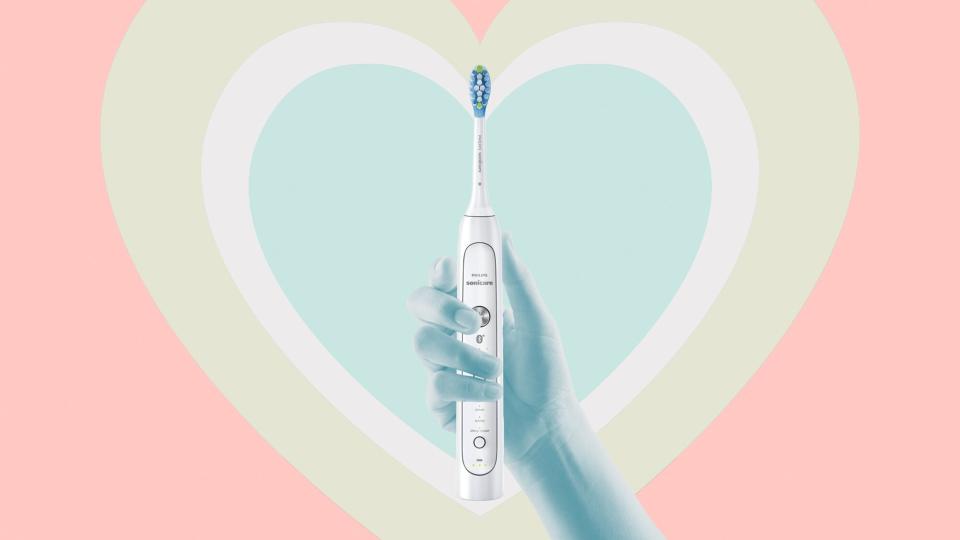The #1 Tool to Improve Gum and Heart Health, According to Dentists
Dotdash Meredith and Yahoo Inc. may earn commission or revenue on some items through the links below.

Amazon - Getty Images / Issarawat Tattong
A whopping 47% of Americans 30 and older have gum disease (AKA periodontal disease), the CDC reports. And our less-than-stellar dental health is impacting much more than our teeth. Over time, chronic inflammation related to swollen, tender gum tissue puts our bodies at increased risk for a whole host of health problems, including heart disease, according to Harvard Medical School researchers.
There is no cure for periodontal disease but there is a treatment that can stop it, and in some cases, regenerate lost bone, says Shervin Molayem, DDS, a periodontist and the director of the Mouth-Body Research Institute in Los Angeles. The best course of action (whether you officially have gum disease or are aiming to prevent it) is to start ASAP to prevent any further damage.
Dr. Molayem and Brian Kantor, DDS, a cosmetic dentist at Lowenberg, Lituchy & Kantor in New York City who we tapped for his opinion, both adore the brand-new Philips Sonicare FlexCare Platinum Connected. Another benefit—it happens to be 50% off right now!
- 99.99 Available at Amazon
"This smart electric toothbrush has all of the features of the other Sonicare toothbrushes, like the Sonicare technology, which can remove up to four times more plaque than a manual toothbrush," Dr. Kantor says.
But what really takes it over the top is the smart technology.
"This is a great way to track and make sure to do it regularly," Dr. Molayem says.
Beyond reminding you when to replace the toothbrush head, as you brush, a sensor tracks your movement and sends data to an app. A 3D map of your mouth allows the brush to detect which teeth you are brushing, locations in which you're brushing too much or too little, where you're brushing too hard and if you missed any spots.
"The app also provides progress reports which allow you to set goals and send these to your dentist," Dr. Kantor says. "Great oral hygiene can start with using an electric toothbrush that can time how long you spend brushing and can even inform you when not cleaning properly."
So, how exactly are gum health and heart health related?
"Teeth are held in the mouth by the jaw bone, and one of the dirtiest parts of our bodies is the mouth. There are over 100 million bacteria on a dirty tooth," explains Dr. Molayem. "These microscopic bacteria may leak between the gum and root and into the bone thereby deteriorating the bone. This infection softens the surrounding bone and can cause the tooth to become loose and need for tooth removal."
Bacteria essentially leak into the gum tissue and enter other organs within the body, including the heart. These bacterial "invaders" have been linked to higher chances of heart attacks, stroke, Alzheimer's disease and five different types of cancer, Dr. Molayem says. Females with gum disease also have three times the chance of getting breast cancer compared to their gum disease-free female peers.
Related: 3 Foods That Could Activate Your Longevity Genes, According to a Neurosurgeon
"Our body is one system. The same blood that flows through our gums travels throughout our entire bloodstream in one minute. There's a direct connection of the blood vessels that feed the mouth that drain right down the jugular veins and enter into the right atrium of the heart. From there, it gets pumped into the lungs and thereafter through every organ in the body," Dr. Molayem explains.
Since our body has that same system from birth, what's so magic about that age of 30 we mentioned?
"The first third of our lives, the bacteria in our mouth are the type that attack the tooth and cause cavities. When we get into our 30s is when that bacteria shifts to predominantly anaerobic bacteria and these bacteria attack the gum and the bones around our teeth," Dr. Molayem says.
Since there aren't many nerves in the gum tissue or jaw bone region, 94% of those with gum disease don't even feel anything "off" when they're living with the condition, Dr. Molayem adds. For this reason, some dentists have declared it a "silent disease." It's vital to schedule semi-annual cleanings and check-ups with your dentist, and to make your own dental hygiene a priority—for your mouth, your heart and your entire body.
"An inflammatory response in the gums can lead to an inflammatory response in the rest of the body. So, having a healthy mouth and healthy gums can lead to overall health," says Dr. Kantor
Bottom line
The amount of people that actually floss daily is astonishingly low, Dr. Molayem says, likely between 20% 30%. Aim to floss at least once a day and brush twice daily for 2 full minutes, the American Dental Association (ADA) recommends. (Most Americans clock in at about 45 seconds per session.) Dr. Molayem and Dr. Kantor both suggests employing an electric toothbrush, which research has proven to be more effective than a manual toothbrush.
"If someone isn't good at manually brushing their teeth, then an electric toothbrush will do a better job. Electric toothbrushes remove plaque and stains more effectively, while still being gentle on tooth enamel and helping to prevent gum recession," Dr. Kantor says.
Make these practices habits, and you should be well on your way to keeping your pearly whites—and your heart—in great shape. For even more wellness wins, load up your menu with these best foods for healthy teeth and gums and discover four beyond-brushing ways to keep your teeth healthy.

